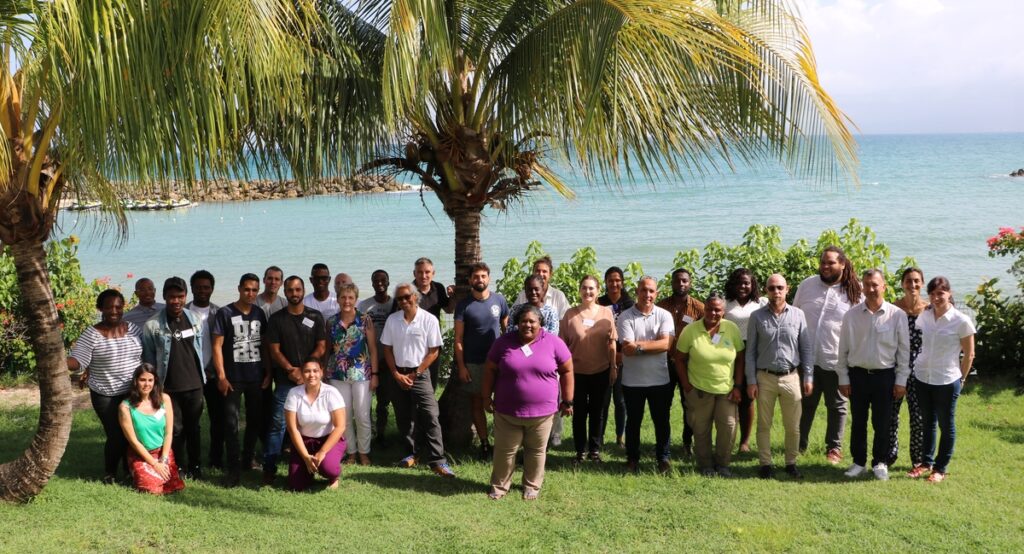The event took place from June 3rd to 5th, 2024. Our Caribaea Initiative Training and Reinforcement Workshop focused on developing foundational skills in conservation biology for post-graduate students, early-career researchers, and wildlife technicians living in the insular Caribbean. It was a unique opportunity to update knowledge, discover new techniques, and exchange ideas with research scientists and conservationists working in the region.

The 2024 edition focused on two main themes: the challenges related to the study of zoonoses in the context of the "One Health" approach, and the opportunities provided by modern techniques for remote monitoring of animal species (including data collection and analysis). The sessions were led by several scientists and professionals specialized in both fields.
Read the article
Programme
Monday June 3rd
- 9:00-12:00. Oral presentations by Caribaea Initiative students and alumni (attendance limited to Caribaea Initiative students, staff and council members)
- 14:00-18:00. Opening of the workshop. Session 1, theme 1 - Zoonoses and the One Health approach (general presentation of the One Health approach, importance of monitoring pathogens in the insular Caribbean)
- Agnès Leblond: One Health in practice
- Nicole Herbert: Significant pathogens and zoonoses of marine animals in the Caribbean region
- Sylvie Lecollinet: Pathogens responsible for zoonoses and their surveillance in the Caribbean context
- Séverine Ferdinand: The Fly Route of Extended-Spectrum-β-Lactamase-Producing Enterobacteria Dissemination in a Cattle Farm
- Howard Nelson: Interdisciplinarity in Nature Conservation
- Alain Sandoz: Closing remarks
- 18:30-21:00. Poster session presented by Caribaea Initiative students and alumni. Cocktails
Tuesday June 4th
- 9:00-12:00. Session 2, theme 1 - Zoonoses and the One Health approach (practical and safety issues)
- Critical reading of articles (Nicole Herbert, Sylvie Lecollinet, Howard Nelson) to complete knowledge on zoonotic risks and the methods of transmission of important pathogens in the Caribbean area.
- Cartographic representation of observations for decision support (Alain Sandoz, Agnès Leblond): acquisition of basic notions of cartographic tools to describe / predict the distribution of a species or a disease.
- 14:00-18:00. Session 3, theme 2 - Recent advances in remote sensing methods for wildlife management: acoustic recorders (Juliette Linossier, Biophonia)
- Student round table “what experiences with bioacoustics?”
- The basis of passive acoustics
- Introduction to machine learning
- Introduction and preparation for the practical exercise
Wednesday June 5th
- 9:00-12:00. Session 4, theme 2 - Recent advances in remote sensing methods for wildlife management: acoustic recorders (Juliette Linossier, Biophonia)
- Exploration of data collected during the night using various tools (Audacity, Kaleidoscope, Chirpity, etc.)
- Analysis of an “example” dataset and use of a Jupyter notebook
- Introduction to best practices in passive acoustics database management, with concrete examples
- Discussion of students' projects and reflection on how to set up protocols using the knowledge acquired during the training course
- 13:30-18:00. Session 5, theme 2 - Recent advances in remote sensing methods for wildlife management (drones and camera traps)
- Christopher Cambrone & Bryan Leborgne: Introduction to the use of camera traps in wildlife biology
- Guillaume Rieucau: Introduction to the use of drones for the survey of the marine megafauna
Thursday June 6th
- 9:00-11:30. Session 6, theme 2 - Recent advances in remote sensing methods for wildlife management (drones and camera traps)
- Christopher Cambrone & Bryan Leborgne: Camera-trap data processing
- Guillaume Rieucau: Exploiting data obtained with aerial drones
- 11:30-12:00. Closing remarks
Practical information
Location
Le Gosier, Guadeloupe.
Language
The workshop is conducted in English.
Price
Caribaea Initiative is pleased to cover all the participation fees for our actual students and our former students that are still in the field of conservation in the Caribbean. Registrations are open for anyone interested, at the following price (the price includes meals & coffee breaks):
- Theme 1: €100.
- Theme 2: €200
- Whole workshop: €270
Information & registration
Please contact us at workshop[at]caribaea.org

